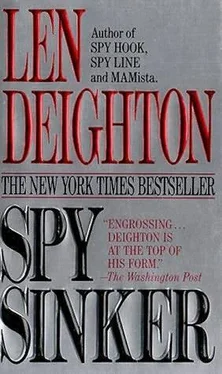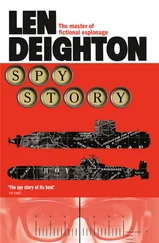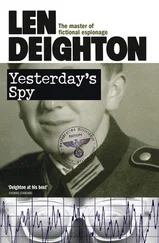Len Deighton - Spy Sinker
Здесь есть возможность читать онлайн «Len Deighton - Spy Sinker» — ознакомительный отрывок электронной книги совершенно бесплатно, а после прочтения отрывка купить полную версию. В некоторых случаях можно слушать аудио, скачать через торрент в формате fb2 и присутствует краткое содержание. Жанр: Триллер, на английском языке. Описание произведения, (предисловие) а так же отзывы посетителей доступны на портале библиотеки ЛибКат.
- Название:Spy Sinker
- Автор:
- Жанр:
- Год:неизвестен
- ISBN:нет данных
- Рейтинг книги:4 / 5. Голосов: 1
-
Избранное:Добавить в избранное
- Отзывы:
-
Ваша оценка:
- 80
- 1
- 2
- 3
- 4
- 5
Spy Sinker: краткое содержание, описание и аннотация
Предлагаем к чтению аннотацию, описание, краткое содержание или предисловие (зависит от того, что написал сам автор книги «Spy Sinker»). Если вы не нашли необходимую информацию о книге — напишите в комментариях, мы постараемся отыскать её.
Spy Sinker — читать онлайн ознакомительный отрывок
Ниже представлен текст книги, разбитый по страницам. Система сохранения места последней прочитанной страницы, позволяет с удобством читать онлайн бесплатно книгу «Spy Sinker», без необходимости каждый раз заново искать на чём Вы остановились. Поставьте закладку, и сможете в любой момент перейти на страницу, на которой закончили чтение.
Интервал:
Закладка:
The official British version of the events is very short. It was drafted by Silas Gaunt, who omitted any mention of the exchange of men because neither was a British national. It says that Pavel Moskvin – a KGB colonel on official duties in the West sector of Berlin – ran amok in the flea market. He fired his pistol indiscriminately until the Berlin municipal police were able to subdue him. Two passers-by were shot dead, four were injured, two seriously. Moskvin turned his own pistol on himself at the moment of arrest.
The secret file compiled by the West German government in Bonn had the advantage of detailed reports from both the West Berlin police and their intelligence service. It says that Moskvin was part of a KGB party who'd come West to arrange the exchange of a West German and a Soviet national held by the British SIS. This account says that Moskvin's death was an execution carried out by a KGB team which used two motor bikes to follow Moskvin's car. While it was halted on Tauentzienstrasse, near the KaDeWe department store, an accomplice threw a plastic bag filled with white paint over its windscreen. Moskvin left the car and ran to the S-Bahn station, shooting at his pursuers. At this time civilians were injured by gunshot wounds. When Moskvin jumped down from the platform to the train tracks, perhaps believing he could run along the railway and across the Wall, he was shot dead by a round fired from a Russian Army sniper's rifle. The perpetrator was never found but is believed to have been one of the KGB hit team who'd been seen coming through a checkpoint earlier that day. In support of this theory it is pointed out that there was never a request for Moskvin's body to be returned to the East.
A few days after the shooting, an unofficial mention of the body by British contacts brought from the Soviets only puzzled denials that any Colonel Pavel Moskvin had ever existed. There was no post-mortem. The body was buried at the small cemetery in Berlin-Rudow, very near the Wall. It was at this time that the Russians spontaneously offered to return to the West the remains of Max Busby, an American shot while crossing the Wall in 1978, Some inferred that it was part of a secret deal. Both bodies were buried at night in adjoining plots. It was at the time when the new drainage was being installed at the cemetery, and the burials were unattended except for workmen, a city official and two unidentified representatives of the Protecting Powers. The graves were not marked.
There were other versions too: some less bizarre, some considerably more so. One report, neatly bound and complete with photos of Kleiststrasse, Nollendorfplatz, the S-Bahn station, the U-Bahn station and a coloured street plan showing Moskvin's path in red broken line, had been assembled by the CIA office in Berlin, working in conjunction with its offices in Bonn and London. This revealed that Moskvin had been preparing material to incriminate falsely an unnamed US citizen resident in London. It concluded that the KGB were determined that Moskvin should not be taken alive and questioned by the British.
Bernard Samson was seen firing at Moskvin but his report, given verbally, said that his rounds all went wide. Some people have pointed out that the great preponderance of rounds that Samson has been known to fire, prior to this, hit his targets. Frank Harrington might have thrown some light on the subject, for Frank had been seen on the S-Bahn station brandishing a gun (something that stayed in the minds of those who saw him because Frank had never been seen with a pistol before, or since), but London Central never asked Frank for an account of it.
Bret Rensselaer was also there but Bret was never questioned specifically. He was hit and severely injured, and by the time he'd recovered sufficiently to contribute an account of it, the reports were complete and the incident had passed into Berlin's crowded history. The doctors at the Steglitz Clinic saved Rensselaer's life. He was in the operating theatre for three hours and went from there into an intensive-care ward. Next day his brother flew in on some specially assigned US Air Force jet that came complete with doctors and nurses. He took Bret back to America with him.
23
England. March, 1987.
Bernard Samson was spending that Saturday at home with Gloria in their little house at 13, Balaklava Road, Raynes Park, in London's commuter belt. He was clearing all sorts of unwanted oddments from the garden shed. Most of them were still in the big cardboard boxes bearing the name of the moving company which had brought their furniture here.
Gloria was upstairs in the bedroom. The wardrobe door was open to reveal a long mirror in which she was studying herself. In front of her she was holding a dress she had found in one of the cardboard boxes. It was an expensive dress with a Paris label, a dramatic low-cut cocktail dress of grey and black, the barber-pole stripes sweeping diagonally with the bias cut. It belonged to Fiona Samson.
As she held it up she tried to imagine herself wearing it. She tried to imagine what Fiona was really like and what sort of a marriage she had enjoyed with Bernard and the children.
Bernard was wearing his carpet slippers and came noiselessly upstairs. Entering the room without knocking he exclaimed, 'Oh!' Then he recognized the dress she was holding and said, 'Far too small! And grey is not your colour, my love.'
Embarrassed to be caught with it, Gloria put the dress on the rail in the wardrobe and closed the door. 'She has been away four years. She will never come back, Bernard, will she?'
'I don't know.'
'Don't be angry. Every time I try to talk about her you become bad-tempered. It's a way of blackmailing me into keeping quiet about her.'
'Is that the way you see it?'
Still selfconscious, she touched her hair. 'It's the way it is, Bernard. You want to have me here with you; and you also want to hang on to the increasingly unlikely chance that you will ever see her again.'
Bernard went close and put his arm round her. At first her anger seemed assuaged, but as Bernard went to kiss her she showed a sudden anger. 'Don't! You always try to wriggle out of it. You kiss me; you say you love me; and you shut me up.'
'You keep asking me these questions and I tell you the truth. The truth is that I don't know the answers.'
'You make me feel so bloody insecure,' said Gloria.
'I'm always here. I don't get drunk or run around with other women.'
It was the sort of indignant answer he always gave: a typically male response. He really couldn't understand that that wasn't enough. She tried male logic: 'How long will you wait before you assume she's gone for ever?'
'I love you. We are happy together. Isn't that enough? Why do women want guarantees of permanence? Tomorrow I could fall under a train or go crazy. There is no way that you can be happy ever after . Can't you understand that?'
'Why are you looking at the clock?' she asked, and tried to move apart from him, but he held her.
'I'm sorry. The D-G is going down to Whitelands to see Silas Gaunt this afternoon. I think they are going to talk about Fiona. I'd give anything to know what they say.'
'You think Fiona is still working for London, don't you?'
The question came like an accusation, and it shook him. He made no move whatsoever and yet that stillness of his face revealed the way his mind was spinning. He had never told Gloria of that belief.
'That's why you won't talk of marriage,' she said.
'No.'
'You're lying. I can always tell. You think your wife was sent there to spy-'
'We'll never know the truth,' said Bernard lamely, and hoped that would end the conversation.
'I must be mad not to have seen that right from the beginning. I was just the stand-in. I was just someone to bed, someone to look after your children and keep the house tidy and shop and cook. No wonder you discouraged all my plans to go to college. You bastard! You've made a fool of me.'
Читать дальшеИнтервал:
Закладка:
Похожие книги на «Spy Sinker»
Представляем Вашему вниманию похожие книги на «Spy Sinker» списком для выбора. Мы отобрали схожую по названию и смыслу литературу в надежде предоставить читателям больше вариантов отыскать новые, интересные, ещё непрочитанные произведения.
Обсуждение, отзывы о книге «Spy Sinker» и просто собственные мнения читателей. Оставьте ваши комментарии, напишите, что Вы думаете о произведении, его смысле или главных героях. Укажите что конкретно понравилось, а что нет, и почему Вы так считаете.












